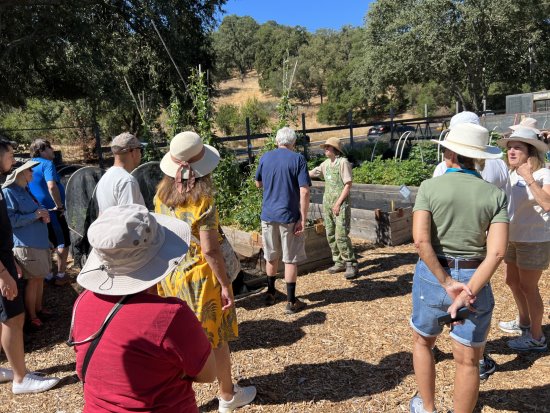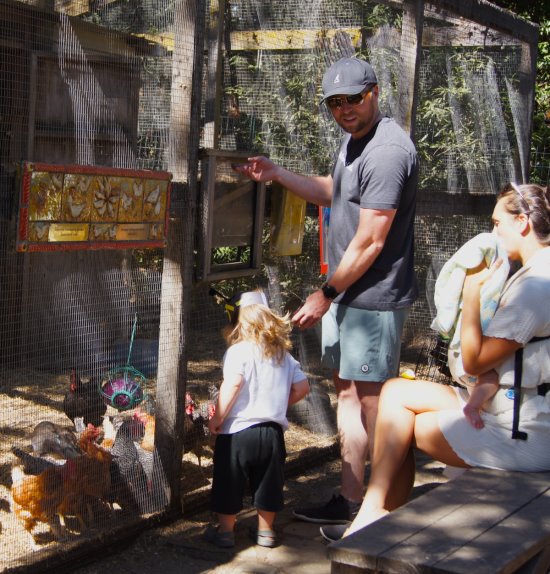 | | | Marilyn Borchardt explaining how LCG grows long beans during the garden tour. Photos Elaine Borden Chandler | | | | | | Down the road from the Lafayette Reservoir lies the Lafayette Community Garden and Outdoor Learning Center (LCG), a quiet, fenced garden that most Lamorinda residents drive by but have never entered. But on the hot Sunday of September 8th, a sign on the gate proclaimed "Welcome to the Harvest Festival" and admitted a stream of new visitors.
 First opened in 2012, the LCG is a cooperative vegetable garden, where members tend to crops that are then communally shared. Every year they have a Harvest Festival where they open their doors to visitors for a day of celebration and learning. This year's topic, The Joy of Bees, was inspired by the beehives that LGC keeps and the importance of bees in plant life.
First opened in 2012, the LCG is a cooperative vegetable garden, where members tend to crops that are then communally shared. Every year they have a Harvest Festival where they open their doors to visitors for a day of celebration and learning. This year's topic, The Joy of Bees, was inspired by the beehives that LGC keeps and the importance of bees in plant life.
 Two tours were given around the garden. The first was given by Marilyn Borchardt, dressed in lively green overalls, who explained the garden and its history as she was peppered with questions by the visitors - which included a group of Master Gardeners.
Two tours were given around the garden. The first was given by Marilyn Borchardt, dressed in lively green overalls, who explained the garden and its history as she was peppered with questions by the visitors - which included a group of Master Gardeners.
 The tour wound through the raised beds of fruits and vegetables that the LHC is centered around, currently filled with tomatoes, potatoes, cucumbers, spinach, summer squash, and grapes. Borchardt described the variety of techniques used to grow the vegetables, including compost tea, watering schedules, mesh cages, and plastic borders to keep out vermin.
The tour wound through the raised beds of fruits and vegetables that the LHC is centered around, currently filled with tomatoes, potatoes, cucumbers, spinach, summer squash, and grapes. Borchardt described the variety of techniques used to grow the vegetables, including compost tea, watering schedules, mesh cages, and plastic borders to keep out vermin.
 She led visitors past the chicken coop, Charlie's Shed where all tools are stored and in-house repairs are done, a central area filled with various booths for the festival, and into the back area, where there is a a Miwok village and a beehive area - all this while covering topics ranging from the origin of the garden's labyrinth to the right time to harvest acorns.
She led visitors past the chicken coop, Charlie's Shed where all tools are stored and in-house repairs are done, a central area filled with various booths for the festival, and into the back area, where there is a a Miwok village and a beehive area - all this while covering topics ranging from the origin of the garden's labyrinth to the right time to harvest acorns.
 The tour ended at the Miwok Village, where Kristin Gaylord and Bruce Moen talked about the Miwok and Saklan people who have lived in the Lafayette area since time immemorial and how the Miwok village is used as an education tool for third grade students. "They get to crush acorns and turn them into powder and run water through them. They just love it all," said Moen.
The tour ended at the Miwok Village, where Kristin Gaylord and Bruce Moen talked about the Miwok and Saklan people who have lived in the Lafayette area since time immemorial and how the Miwok village is used as an education tool for third grade students. "They get to crush acorns and turn them into powder and run water through them. They just love it all," said Moen.
 No acorns were served at this Harvest Festival, but instead a table covered with food made by garden members - including four different kinds of brownies, coffee cake, yuzu compote quick bread, three varieties of apple, sourdough bread with soft butter, melon, iced tea, and lemonade.
No acorns were served at this Harvest Festival, but instead a table covered with food made by garden members - including four different kinds of brownies, coffee cake, yuzu compote quick bread, three varieties of apple, sourdough bread with soft butter, melon, iced tea, and lemonade.
 Two of the members, Lynn Jones, an LHC co-director, and Beth Caldwell, served food, recommended activities, and informed visitors that the beehives at LGC are maintained by the Mount Diablo Beekeeper Association (MDBA) and that MDBA had a table with honey tasting. The honeys ranged from Walnut Creek Spring to Moraga Late Season to Italian Chestnut.
Two of the members, Lynn Jones, an LHC co-director, and Beth Caldwell, served food, recommended activities, and informed visitors that the beehives at LGC are maintained by the Mount Diablo Beekeeper Association (MDBA) and that MDBA had a table with honey tasting. The honeys ranged from Walnut Creek Spring to Moraga Late Season to Italian Chestnut.
 After the second out of three raffles, Jana Thomas gave a quick introduction speech on the history of LHC from when it was EBMUD's refuse heap to today. "One of the things that we really want to do is encourage community members to come visit us, treat us like a park," she said. "We continue to grow and change, but we would love to embrace everyone in the broader community."
After the second out of three raffles, Jana Thomas gave a quick introduction speech on the history of LHC from when it was EBMUD's refuse heap to today. "One of the things that we really want to do is encourage community members to come visit us, treat us like a park," she said. "We continue to grow and change, but we would love to embrace everyone in the broader community."
 Then Jamie Frankenfield and Peter Kritscher of the MDBA gave a talk on honeybees, discussing honeybee evolution, how honeybees came to America, their physiology, their eusociality, and how they have floral fidelity - they only visit one type of plant during a foraging trip - which makes them vital to crop productions.
Then Jamie Frankenfield and Peter Kritscher of the MDBA gave a talk on honeybees, discussing honeybee evolution, how honeybees came to America, their physiology, their eusociality, and how they have floral fidelity - they only visit one type of plant during a foraging trip - which makes them vital to crop productions.
 "Folks, just look around," said Frankenfield. "There'll be bees in all directions, looking for something in that area. I love that stuff. I stay awake at night thinking about that stuff - it's so amazing."
"Folks, just look around," said Frankenfield. "There'll be bees in all directions, looking for something in that area. I love that stuff. I stay awake at night thinking about that stuff - it's so amazing."
 Then Linda Mizes gave a talk on the native bees of California, explaining that there are 1600 species but most of them have not been studied because they pollinate native flowers and not industrialized crops. At this time of year, many of them have gone into holes for the winter because most native California flowers have stopped blooming. "In the fall when the rains come, be careful not to completely dig up all your garden. You might be digging up some of these holes," she reminded the audience.
Then Linda Mizes gave a talk on the native bees of California, explaining that there are 1600 species but most of them have not been studied because they pollinate native flowers and not industrialized crops. At this time of year, many of them have gone into holes for the winter because most native California flowers have stopped blooming. "In the fall when the rains come, be careful not to completely dig up all your garden. You might be digging up some of these holes," she reminded the audience.
 After the talks, Cathy Pretti, a first-time visitor to the LCG, enthused, "I wish I brought a notebook, there was so much that I wanted to remember."
After the talks, Cathy Pretti, a first-time visitor to the LCG, enthused, "I wish I brought a notebook, there was so much that I wanted to remember."
 In addition to MDBA table and the native bee table, there were tables for the Master Gardeners giving advice on everything from dealing with aphids to root care, making folded paper bees, and Recycle Smart. At the Recycle Smart table, Marian Woodard exhibited bin composting and vermiculture, or worm composting. She showed visitors how easily they could start a worm bin with a 10-gallon bucket, and many who stopped at her table left clutching pamphlets on worms.
In addition to MDBA table and the native bee table, there were tables for the Master Gardeners giving advice on everything from dealing with aphids to root care, making folded paper bees, and Recycle Smart. At the Recycle Smart table, Marian Woodard exhibited bin composting and vermiculture, or worm composting. She showed visitors how easily they could start a worm bin with a 10-gallon bucket, and many who stopped at her table left clutching pamphlets on worms.
 As the end time of 2:00 approached, visitors made their last visits, took the free bouquets of dried flowers and lunaria, grabbed their last snacks, and wandered away.
As the end time of 2:00 approached, visitors made their last visits, took the free bouquets of dried flowers and lunaria, grabbed their last snacks, and wandered away.
 The current visiting hours for the LCG are Tuesday 9-11, Thursday 9-12, and Saturday 9-12. These times change but are always posted on a sign on the garden's gate. LCG membership is full for 2024 but they are accepting applications for 2025. Applications can be found at their website https://lafayettecomm
The current visiting hours for the LCG are Tuesday 9-11, Thursday 9-12, and Saturday 9-12. These times change but are always posted on a sign on the garden's gate. LCG membership is full for 2024 but they are accepting applications for 2025. Applications can be found at their website https://lafayettecomm
 unitygarden.org/.
unitygarden.org/. |

